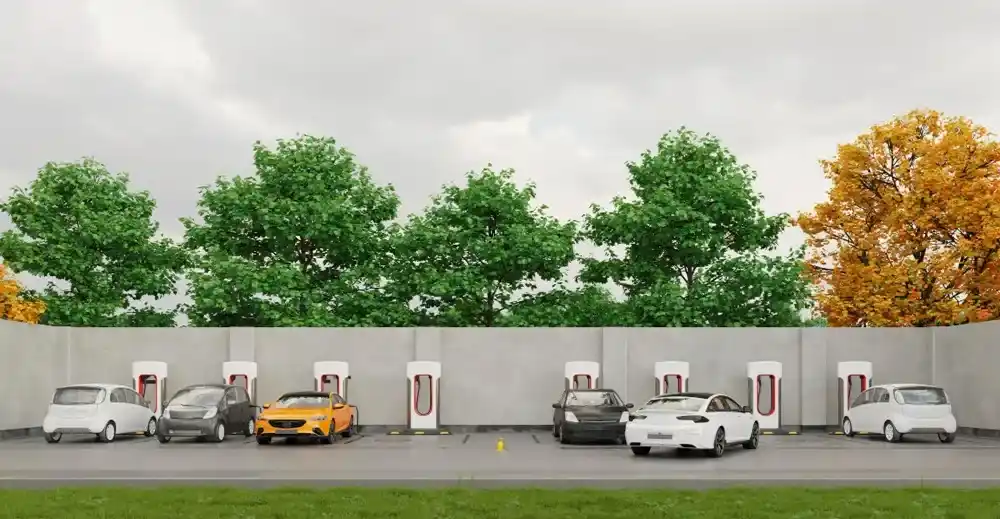Silicon Carbide is Shaping the Future of Electric Vehicles
Silicon Carbide (SiC) is a high-hardness and high-performance material with excellent properties that make it perfect for high-technological applications, especially in electric vehicles (EVs). With its stiffness, thermal conductivity, and electrical resistance, it is a candidate material for numerous high-powertrain applications in EVs. Further, with the high hardness, a SiC-based product is wear-resistant and has excellent heat conduction which is good for dissipating the heat, so as a result of improving performances from electronic components. SiC is a very good electric resistor for high-voltage in comparison to other materials which makes it appropriate for multiple EV applications.
Additionally, SiC components are typically smaller and lighter than silicon counterparts, reducing overall vehicle weight and improving fuel efficiency. They are also a promising material for EVs due to major advantages like fast charging time, and improved battery life with reduced energy consumption. Additionally, SiC devices have a longer lifespan, reducing the need for frequent maintenance and replacements, which makes it a popular choice for the future of EVs. SiC is moreover utilized in semiconductor devices that operate at high temperatures or voltages, like lighting-emitting diodes, and detectors which are integrated into the electronic power devices in EVs to easily handle the high voltages.
Moreover, the leading manufacturers of EVs are increasing the utilization of SiC in EV components. For instance, Audi is equipping its EV models with SiC semiconductor inverters, increasing the efficiency of the vehicle by almost 60%, alongside better reliability. Audi is already offering these water-cooled inverters in their models that perform particularly well under partial load as of the press release from May 2024.
Similarly, the increasing collaboration between EV manufacturers and global SiC components manufacturers is also witnessing a rise. For instance, ROHM announced the use of 4th generation SiC MOSFET bare chips in three ZEEKR EV models from Geely, one of the top 10 global automakers in August 2024. The three flagship models are Geely's ZEEKR EV01, FM10, and 001. These vehicles are gaining interest for their cost value and newness outside China due to features like the 300kW output, with a range of up to 400km on a single charge. In the future, ROHM plans to continue to promote SiC power devices and aims to introduce 5th generation SiC MOSFETs in 2025 and further accelerate its robust product lineup by developing 6th and 7th generation products based on their original key technologies. The company focuses on providing SiC in a variety of formats to promote the widespread adoption of SiC technology.
In addition, SiC business sales targets by ROHM Co., Ltd. for FY2025 and FY2027 have been raised to 130 billion yen and 270 billion yen, respectively. The company also expanded its three-year revenue-generating opportunities to 1.78 trillion yen at the same time. The company management will moreover invest in mid-to-long-term growth of SiC resulting in a production capacity to increment to 35 times that of FY2021 to a value of around 510-billion-yen investment during FY2021 to FY2027 timeline. This will contribute to the advancement and improved vehicle performance in EV vehicles in the coming years.
Figure 1: Increase in Sales Target for the Sic Business of Rohm Co., Ltd., in Billion Yen, in Fy2025 and Fy2027
 Source: ROHM Co., Ltd.
Moreover, SiC is a major development for EVs since it is much better in performance concerning conventional silicon. By minimizing energy losses, it further enhances efficiency and makes more battery power available for vehicle propellent, which translates to a longer driving range. These components also offer faster switching speeds with higher power density which is beneficial for advanced EV development. They can withstand more power output without overheating, which makes them compact and efficient. Besides, the superior thermal conductivity allows them to quickly cool heat away from devices, requiring less bulky cooling systems.
As research and development continue, SiC is expected to witness more innovative and new applications in future EVs. Wolfspeed a worldwide leader in SiC technology introduced a cutting-edge Silicon Carbide module solution to fuel clean energy storage capacity in September 2024. The company collaborated with North American-based utility-scale inverter producer EPC Power to utilize Wolfspeed modules in utility-grade solar and energy capacity frameworks. These modules provide versatile high-power conversion modules, high-performance controls, and system excess. The 2300V modules were developed in the latest 200mm silicon carbide technology and deliver energy effectiveness and cost-effective operational economics, making them ideally suited for energy storage, renewable energy, and high-capacity fast-charging infrastructure. The manufacturing of SiC components and technology is a necessity in transitioning toward the next generation of EVs and advanced electronic devices utilized in these vehicles.
Key Developments:
Source: ROHM Co., Ltd.
Moreover, SiC is a major development for EVs since it is much better in performance concerning conventional silicon. By minimizing energy losses, it further enhances efficiency and makes more battery power available for vehicle propellent, which translates to a longer driving range. These components also offer faster switching speeds with higher power density which is beneficial for advanced EV development. They can withstand more power output without overheating, which makes them compact and efficient. Besides, the superior thermal conductivity allows them to quickly cool heat away from devices, requiring less bulky cooling systems.
As research and development continue, SiC is expected to witness more innovative and new applications in future EVs. Wolfspeed a worldwide leader in SiC technology introduced a cutting-edge Silicon Carbide module solution to fuel clean energy storage capacity in September 2024. The company collaborated with North American-based utility-scale inverter producer EPC Power to utilize Wolfspeed modules in utility-grade solar and energy capacity frameworks. These modules provide versatile high-power conversion modules, high-performance controls, and system excess. The 2300V modules were developed in the latest 200mm silicon carbide technology and deliver energy effectiveness and cost-effective operational economics, making them ideally suited for energy storage, renewable energy, and high-capacity fast-charging infrastructure. The manufacturing of SiC components and technology is a necessity in transitioning toward the next generation of EVs and advanced electronic devices utilized in these vehicles.
Key Developments:
Find some of our related studies:
 Source: ROHM Co., Ltd.
Moreover, SiC is a major development for EVs since it is much better in performance concerning conventional silicon. By minimizing energy losses, it further enhances efficiency and makes more battery power available for vehicle propellent, which translates to a longer driving range. These components also offer faster switching speeds with higher power density which is beneficial for advanced EV development. They can withstand more power output without overheating, which makes them compact and efficient. Besides, the superior thermal conductivity allows them to quickly cool heat away from devices, requiring less bulky cooling systems.
As research and development continue, SiC is expected to witness more innovative and new applications in future EVs. Wolfspeed a worldwide leader in SiC technology introduced a cutting-edge Silicon Carbide module solution to fuel clean energy storage capacity in September 2024. The company collaborated with North American-based utility-scale inverter producer EPC Power to utilize Wolfspeed modules in utility-grade solar and energy capacity frameworks. These modules provide versatile high-power conversion modules, high-performance controls, and system excess. The 2300V modules were developed in the latest 200mm silicon carbide technology and deliver energy effectiveness and cost-effective operational economics, making them ideally suited for energy storage, renewable energy, and high-capacity fast-charging infrastructure. The manufacturing of SiC components and technology is a necessity in transitioning toward the next generation of EVs and advanced electronic devices utilized in these vehicles.
Key Developments:
Source: ROHM Co., Ltd.
Moreover, SiC is a major development for EVs since it is much better in performance concerning conventional silicon. By minimizing energy losses, it further enhances efficiency and makes more battery power available for vehicle propellent, which translates to a longer driving range. These components also offer faster switching speeds with higher power density which is beneficial for advanced EV development. They can withstand more power output without overheating, which makes them compact and efficient. Besides, the superior thermal conductivity allows them to quickly cool heat away from devices, requiring less bulky cooling systems.
As research and development continue, SiC is expected to witness more innovative and new applications in future EVs. Wolfspeed a worldwide leader in SiC technology introduced a cutting-edge Silicon Carbide module solution to fuel clean energy storage capacity in September 2024. The company collaborated with North American-based utility-scale inverter producer EPC Power to utilize Wolfspeed modules in utility-grade solar and energy capacity frameworks. These modules provide versatile high-power conversion modules, high-performance controls, and system excess. The 2300V modules were developed in the latest 200mm silicon carbide technology and deliver energy effectiveness and cost-effective operational economics, making them ideally suited for energy storage, renewable energy, and high-capacity fast-charging infrastructure. The manufacturing of SiC components and technology is a necessity in transitioning toward the next generation of EVs and advanced electronic devices utilized in these vehicles.
Key Developments:
| Year | Development |
| September 2024 | STMicroelectronics introduced its fourth-generation STPOWER SiC MOSFET technology which enables the next generation of EV traction inverters. The technology features higher power efficiency, power density, and robustness which makes it suitable for automotive markets. The technology will be adopted in steadily increasing volumes through to the end of 2025 over the 750V and high voltage of 1200V classes, extending its reach beyond premium models to greater numbers of mid-size and compact battery EVs. |
| June 2024 | Navitas Semiconductor announced its Gen-3 Fast SiC MOSFETs for high-speed switching, efficiency, and higher power density. Best suited for applications as AI data center power supplies, onboard chargers, fast EV roadside superchargers, and solar/energy-storage solutions. The portfolio spans packages from D2PAK-7 to TO-247-4, targeting stringent, high-power, high-reliability applications. |
| May 2024 | Infineon Technologies AG, a global leader in power systems and IoT agreed to supply Xiaomi EV with SiC power modules HybridPACK™ Drive G2 CoolSiCTL™ for its SU7 smart EV until 2027. CoolSiC technology from the company provides better performance for e-mobility, in turn enabling higher operating temperatures, ultimately best-in-class performance, driving dynamics, and a lifetime of EVs. |
| January 2023 | Wolfspeed, Inc. announced supplying Silicon Carbide devices for powering future Mercedes-Benz electric vehicle platforms, with higher efficiency powertrains. The semiconductors will be employed in succeeding powertrain systems of numerous Mercedes-Benz vehicle series. Wolfspeed has been named by the company as one of the major SiC partners for its future Silicon Carbide devices with a main target on preferred long-term supply, technology, and quality of this critical semicon device core to their electrification product plans. |
Get in Touch
Interested in this topic? Contact our analysts for more details.
Latest Thought Articles

Top OSAT Companies Driving Semiconductor Assembly and Test Services Worldwide
Recently
EV Charging Stations Market Outlook: Smart Charging, Fast Charging, and Regional Expansion
Recently
Future of Corporate Wellness: Global Trends and Regional Outlook
Recently
Regional Breakdown of the Mechanical Keyboard Market: Who Leads and Why?
Recently